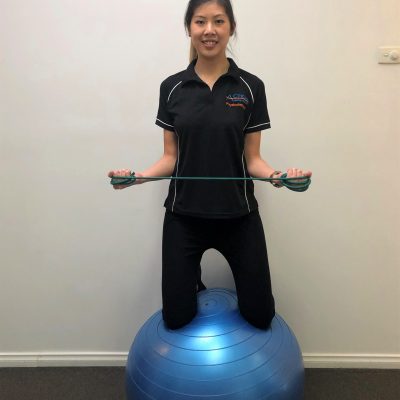People with dementia can live an active life and live well for many years after their diagnosis. A little support from physiotherapy can make a big difference for those with dementia – helping them to live safely and confidently at home, and maintaining a level of independence with daily tasks.
How physiotherapy can help those living with dementia
Dementia affects the brain’s ability to perform tasks of everyday life. Exercise is essential to maintain good blood flow to the brain and reduce cardiovascular risk factors. There is some evidence that exercise encourages new brain cell growth and survival and reduces the risk of cognitive decline and dementia.
People living with dementia are at risk of falls and hip fractures. Unfortunately, this leads to an increased risk of hospitalisation and higher rates of mortality.
Many people with dementia live in residential aged care where they often do not have the same access to rehabilitation services such as physiotherapy to those living in their own homes in the community. People with dementia have the same, if not greater, need for strength, balance and mobility programs as everyone else.
Our physiotherapists can visit clients in their own homes or residential aged care facilities and help them maintain their physical activity. Physiotherapy can improve strength, fitness. balance and endurance. This helps to reduce the risk of falls and also improves activities of daily living and quality of life.
Assessing pain and injuries in dementia
Our physiotherapists are skilled in assessing injuries and pain in people with dementia and offer a holistic approach to treatment. Communication, understanding and memory may be a problem for the individual so alternate methods often need to be used. The physiotherapist can observe the clients’ movement and function and use touch, palpation, strength and resistance to assess pain and injury.
Verbal and non-verbal ways that the client may communicate about their pain such as vocalizing, grimacing, flinching or guarding will also be used. Muscles respond in different ways to pain so testing for tight, stiff and rigid muscles can indicate injury.
Involving family and carers in physiotherapy for dementia
It is helpful to have carers or relatives present during the assessment to ensure the physiotherapist has a comprehensive record of the clients’ medical history, daily routine, problems and hobbies.
Observing the exercises and functional activities during the treatment sessions supports ongoing encouragement and integration into the clients daily living.
How to engage people with dementia in physiotherapy
There are often barriers to participating in physiotherapy due to poor communication, understanding and memory. Our physiotherapists are skilled at being creative with exercises and functional activities. Building rapport with the client and having a good understanding of their life and hobbies helps to guide conversations to motivate and engage them. Developing functional activities and exercises that reflect their lifestyle, hobbies and passions will help to achieve their goals and the best outcome.
Treating people with dementia
Following the assessment, the physiotherapist will provide a clear diagnosis or list of problems, and develop an action plan with realistic goals and an appropriate treatment plan. The clients individual needs will be considered when developing the action plan.
Treatment plans may include:
- Pain relief
- Strengthening exercises
- Dynamic balance activities
- Functional tasks – getting washed and dressed, cleaning
- Safe transfer eg up/down from chair, on/off the bed, chair to frame/wheel chair
- Mobility practice within and outside the home
- Navigating stairs/slopes
- Recommendation for mobility aids and equipment
Examples of exercises used in people with dementia
- Dynamic balance – kicking a ball or simple dance moves.
- Upper limb strength and coordination – throwing and catching a ball
- Increase lower limb strength and balance – sit to stand from the chair
How Action Home Rehab physiotherapists support clients with dementia
Our physiotherapists promote independence and wellbeing by focusing on what your loved one with dementia can still do. We strive to help improve the client’s quality of life.
Building relationships with clients and looking for the small and meaningful things to engage and motivate their clients, our physiotherapists can really make a difference.
If you have a loved one who would benefit from physiotherapy contact one of our friendly staff to see how one of our team of physiotherapists can help.
See Dementia Q&A on Physical exercise and dementia from Dementia Australia





